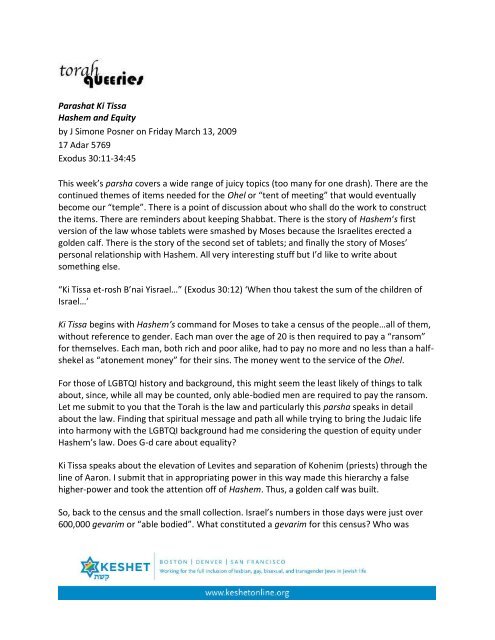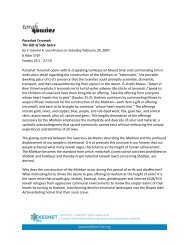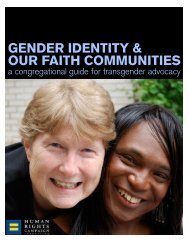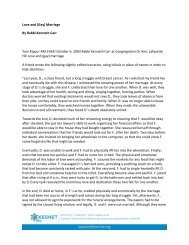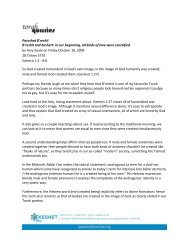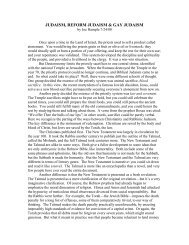Parashat Ki Tissa Hashem and Equity by J Simone Posner ... - Keshet
Parashat Ki Tissa Hashem and Equity by J Simone Posner ... - Keshet
Parashat Ki Tissa Hashem and Equity by J Simone Posner ... - Keshet
You also want an ePaper? Increase the reach of your titles
YUMPU automatically turns print PDFs into web optimized ePapers that Google loves.
<strong>Parashat</strong> <strong>Ki</strong> <strong>Tissa</strong><br />
<strong>Hashem</strong> <strong>and</strong> <strong>Equity</strong><br />
<strong>by</strong> J <strong>Simone</strong> <strong>Posner</strong> on Friday March 13, 2009<br />
17 Adar 5769<br />
Exodus 30:11-34:45<br />
This week’s parsha covers a wide range of juicy topics (too many for one drash). There are the<br />
continued themes of items needed for the Ohel or “tent of meeting” that would eventually<br />
become our “temple”. There is a point of discussion about who shall do the work to construct<br />
the items. There are reminders about keeping Shabbat. There is the story of <strong>Hashem</strong>‘s first<br />
version of the law whose tablets were smashed <strong>by</strong> Moses because the Israelites erected a<br />
golden calf. There is the story of the second set of tablets; <strong>and</strong> finally the story of Moses’<br />
personal relationship with <strong>Hashem</strong>. All very interesting stuff but I’d like to write about<br />
something else.<br />
“<strong>Ki</strong> <strong>Tissa</strong> et-rosh B’nai Yisrael…” (Exodus 30:12) ‘When thou takest the sum of the children of<br />
Israel…’<br />
<strong>Ki</strong> <strong>Tissa</strong> begins with <strong>Hashem</strong>’s comm<strong>and</strong> for Moses to take a census of the people…all of them,<br />
without reference to gender. Each man over the age of 20 is then required to pay a “ransom”<br />
for themselves. Each man, both rich <strong>and</strong> poor alike, had to pay no more <strong>and</strong> no less than a halfshekel<br />
as “atonement money” for their sins. The money went to the service of the Ohel.<br />
For those of LGBTQI history <strong>and</strong> background, this might seem the least likely of things to talk<br />
about, since, while all may be counted, only able-bodied men are required to pay the ransom.<br />
Let me submit to you that the Torah is the law <strong>and</strong> particularly this parsha speaks in detail<br />
about the law. Finding that spiritual message <strong>and</strong> path all while trying to bring the Judaic life<br />
into harmony with the LGBTQI background had me considering the question of equity under<br />
<strong>Hashem</strong>’s law. Does G-d care about equality?<br />
<strong>Ki</strong> <strong>Tissa</strong> speaks about the elevation of Levites <strong>and</strong> separation of Kohenim (priests) through the<br />
line of Aaron. I submit that in appropriating power in this way made this hierarchy a false<br />
higher-power <strong>and</strong> took the attention off of <strong>Hashem</strong>. Thus, a golden calf was built.<br />
So, back to the census <strong>and</strong> the small collection. Israel’s numbers in those days were just over<br />
600,000 gevarim or “able bodied”. What constituted a gevarim for this census? Who was
counted? Who was NOT counted? Were there people who expressed gender differently back<br />
then? Were these persons counted? Were trans-women considered able-bodied men? Were<br />
trans-men counted among the women? Torah doesn’t speak with their voices, so I have to look<br />
at the collection G-d required to find traces of equity.<br />
Previously in “Terumah” (Exodus 25) the Israelites were asked to make a contribution<br />
suggested <strong>by</strong> their hearts. It could be red yarn or lapis lazuli or precious metal or goats hair <strong>and</strong><br />
not in any specified amounts or requirements <strong>by</strong> caste. This donation was used to build the<br />
Ohel <strong>and</strong> its contents.<br />
In verse 15, the comm<strong>and</strong>ment specifies that the half shekel should be paid <strong>by</strong> rich <strong>and</strong> poor<br />
alike. This “half-shekel” offering for atonement is more on a spiritual plane <strong>and</strong> not determined<br />
<strong>by</strong> one’s wealth. It is mentioned in this parsha that a shekel is 20 gerahs <strong>and</strong> the half would be<br />
10 gerahs. According to ancient weights <strong>and</strong> measures 1 gerah = .41667 grams <strong>and</strong> therefore<br />
10 gerahs (or a half-shekel).<br />
If we use silver as a measure of monetary equivalence, (a whopping $14 USD for an ounce- or<br />
28.35 grams) that would mean the price of salvation (even with the outrageous price of<br />
precious metals during our present economic crisis) is about $2.00 USD. This is a price that even<br />
the most financially strapped LGBTQI person could afford even if they couldn’t afford their rent,<br />
clothes, medicines, food or other basic necessities.<br />
Many point to this book to proclaim the greatness of Moses, of the Levites (who <strong>by</strong> the way go<br />
on a killing spree in Exodus 32:26-29 if you are into blood <strong>and</strong> gore) the Kohenim who in spite<br />
of their wisdom <strong>and</strong> ceremonies <strong>and</strong> vestments still somehow preside over the forging of a<br />
golden calf <strong>and</strong> then fudge it when retelling the tale to Moses.<br />
This parasha tells me in the most unequivocal way, that it is not <strong>Hashem</strong> that is ever in error,<br />
but humankind. <strong>Hashem</strong> asks for things from all people <strong>and</strong> usually the same things in the same<br />
way. This is true equity under the law. It is humankind who seeks to separate <strong>and</strong> make<br />
distinctions perhaps because of a most un-divine way of judging people, places, things <strong>and</strong><br />
scenarios that most require <strong>Hashem</strong>‘s implanted “divine spark”.<br />
For many years the Trans community had a terrible problem with such a caste system where<br />
Drag Queens would fight MTF Transsexuals <strong>and</strong> everyone fought against Transvestites <strong>and</strong><br />
there was no unanimity among even the Transsexuals who had no common-ground between<br />
the MTF <strong>and</strong> FTM factions. And lets not forget MTF’s who would argue ceaselessly among<br />
themselves about which surgical intervention/method/practitioner was the best. This all<br />
happened before the word “Transgender” was in common use. That was yet another story.
Still not sure about equity under <strong>Hashem</strong>’s law or how unity under <strong>Hashem</strong>’s law will deliver<br />
us? Lets take a look at Exodus 31. Verse 12. It begins with reminding the Israelites about their<br />
covenant <strong>and</strong> how it is important to keep Shabbat because <strong>Hashem</strong> rested on day seven. How<br />
can I work on Shabbat if <strong>Hashem</strong> didn’t? Do I think I’m better than <strong>Hashem</strong>? Humility before<br />
<strong>Hashem</strong> is the manifestation of equity under the law. For those who go to synagogue regularly<br />
verses 16 <strong>and</strong> 17 form the familiar V’shamru heard in many Shabbat services everywhere:<br />
The Israelite people shall keep the sabbath, observing the sabbath throughout the ages as a<br />
covenant for all time: it shall be a sign for all time between Me <strong>and</strong> the people of Israel. For in<br />
six days the Lord made heaven <strong>and</strong> earth, <strong>and</strong> on the seventh day He ceased from work <strong>and</strong><br />
was refreshed. Exodus 31:16-17<br />
About 20 years ago, there was a story I heard about a transwoman who tried to get religious<br />
permission from a rabbi to change gender, <strong>and</strong> live <strong>and</strong> function <strong>and</strong> a woman within the<br />
community. This rabbi told her that she was an abomination. She said it was a matter of pikuah<br />
nefesh (the rule that says a law can be broken to save a life) <strong>and</strong> the rabbi (A Cohen <strong>by</strong> the way)<br />
told her that even under the Noahide laws, it wouldn’t pass <strong>and</strong> that she would be better off<br />
killing herself. As she walked out of his office, she asked one final question: since this religion<br />
had now utterly rejected her, could she now disown <strong>and</strong> disavow herself of its barbarism? The<br />
Rabbi told her she was not excused; not excused from keeping kosher <strong>and</strong> not excused from<br />
keeping Shabbat. This seeming slap in the face put the focus back on <strong>Hashem</strong> <strong>and</strong> gave that<br />
woman just enough space to live <strong>and</strong> function as a Jew today.<br />
If you feel someone out there is struggling with spirituality <strong>and</strong> religion tell them to try to keep<br />
Shabbat <strong>and</strong> point them to the text of the V’Shamru.<br />
One final thing about the census. This is just another way of saying “st<strong>and</strong> up <strong>and</strong> be counted.”<br />
There is a spiritual message, too, I think. Earlier in the week we hear the reading of the<br />
Megillah. In Esther 4:12 Mordechai tells Esther that she must risk death <strong>and</strong> come out about<br />
her Jewishness to save the lives of many others. I think this resonates exactly with the census<br />
<strong>and</strong> “counting heads.” The LGBTQI community will grow <strong>and</strong> aspire closer to <strong>Hashem</strong> as we all<br />
st<strong>and</strong> up <strong>and</strong> be counted <strong>and</strong> put our ten cents USD towards a cause that will bring about our<br />
atonement <strong>and</strong> redemption.


